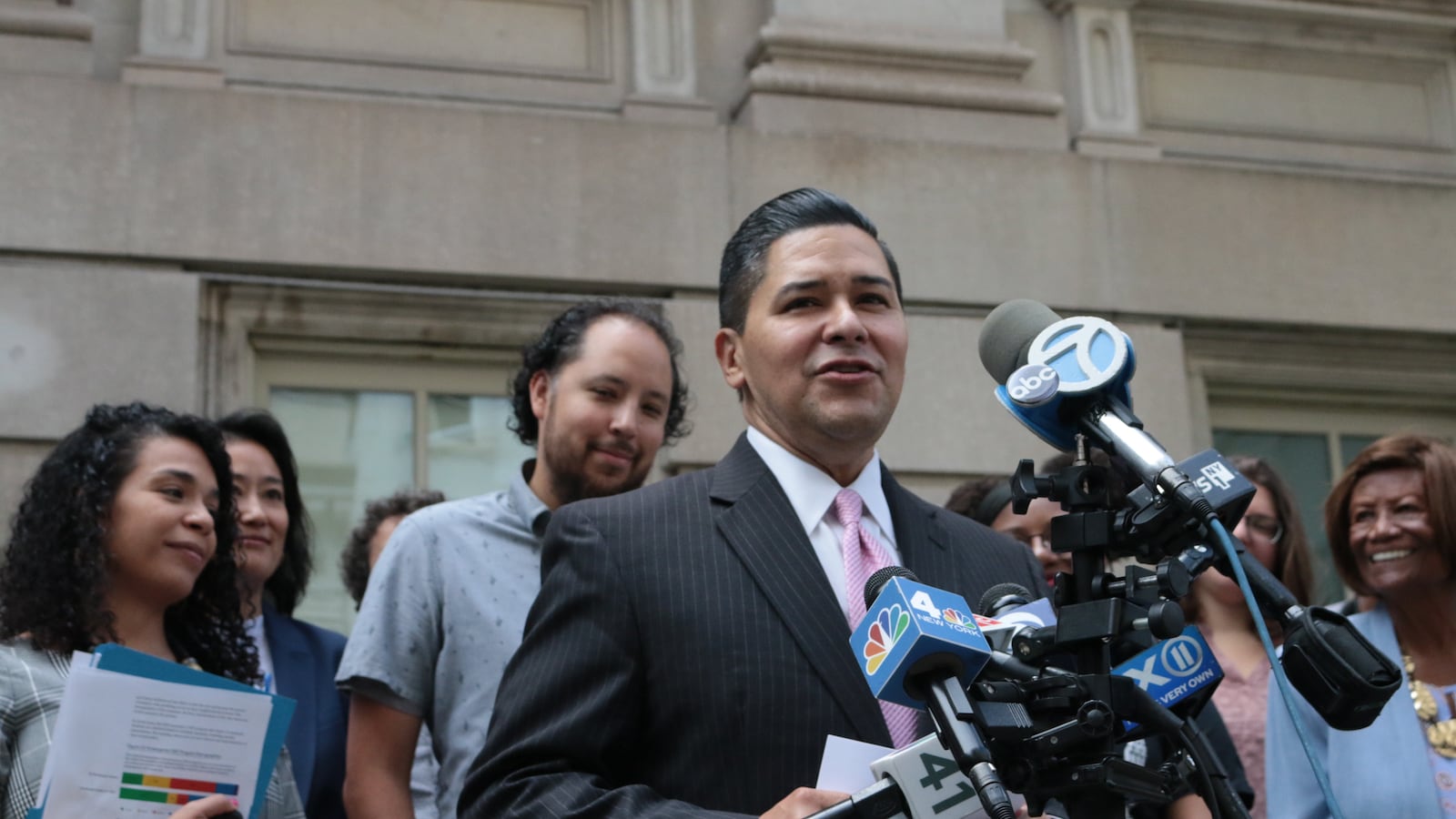Opposition mounted Tuesday against a set of proposals to help integrate New York City schools that includes phasing out gifted and talented programs.
But Schools Chancellor Richard Carranza, who has bluntly called out racial inequities in the country’s largest school system, broadly signaled his support for the sweeping changes.
At a press conference outside of the education department’s central headquarters, Carranza said the School Diversity Advisory Group’s suggestions “point to a future where every student has access to a rigorous, inspiring, engaging, nurturing education.”
He stopped short of discussing the particulars of the proposals, which also called for significantly reducing the use of competitive admissions standards in middle and high schools. But he said he would review the recommendations and take action “as soon as humanly possible.”
The advisory group, appointed by Mayor Bill de Blasio in 2017 to recommend ways to encourage integration in one of the most segregated school systems in the country, unveiled a set of proposals Monday night that called for significantly curbing New York City’s widespread use of selective admissions methods.
Ultimately it’s up to de Blasio to accept the group’s recommendation, and he’s been reluctant to embrace top-down integration mandates — with the notable exception of his stalled plan to overhaul admissions at the city’s prestigious but segregated specialized high schools. The mayor did little to tip his hand on Tuesday when asked during a morning television appearance about the group’s recommendations.
“I’m going to assess it and my schools chancellor is going to assess it,” he said, adding later, “There is not a contradiction between ensuring fairness in admissions and diversity in the classroom — and also having great academics.”
What is likely to be the most controversial recommendation is the move to eliminate gifted programs as they currently exist. The programs enroll mostly white and Asian students, even though black and Hispanic students account for a majority of city students. Admission is usually in kindergarten and based on a single test that children take when they’re about 4 years old.
Gifted programs have been seen as a political third rail, coveted by white, middle-class families who might otherwise avoid the public school system. And pushback mounted swiftly.
City Council Speaker Corey Johnson, who is considering a bid for mayor, said he didn’t believe “eliminating gifted and talented programs outright is the solution.” Bronx Borough President Ruben Diaz, who has advocated for more gifted programs in districts that serve mostly children of color, said the city’s solution should be to test all students for gifted programs “in the earliest grades.”
“The path to excellence begins with challenging our students to succeed, not with eliminating opportunity,” he said in a statement.
The powerful teachers union called for access to gifted to be “revamped,” but in a statement, United Federation of Teachers President Michael Mulgrew said, “We do not support the elimination of the city’s gifted and talented programs.”
At the press conference, members of the advisory group tried to reframe the debate around their proposal, saying it was about expanding other teaching approaches that have already proved to be more inclusive and effective for different types of learners. Maya Wiley, an academic at The New School who led the group, pointed to cities like Washington, D.C., where schoolwide models provide “enrichment” for all students.
“We’re not taking away. We’re expanding and adding based on what works, rather than what excludes,” she said. “The facts are that much of what we’re doing doesn’t help the vast majority of our students.”
The group’s proposals were vague about what kinds of programs should replace New York City’s current gifted system, saying local communities should seek input and devise models that work best for them. But members emphasized that, whatever the new programs look like, the education department will have to commit resources to supporting them.
Some members of the group also pushed back against the idea that Asian communities are currently served well by the city’s programs. In the 2017-2018 school year, 42% of offers for gifted admissions went to Asian students, who make up about 16% of enrollment citywide. Still, Vanessa Leung, who helps lead the Coalition for Asian American Children and Families and served on the advisory group, said most Asian students don’t get the opportunity to enroll in gifted programs as they currently stand.
Nequan McLean, the president of Brooklyn’s District 16 Community Education Council, who once advocated for expanding gifted opportunities for black and Hispanic students, said even an expansion wouldn’t serve all children the way new models would.
“After looking at this program and what it has done… it’s not equitable,” McLean said. “It’s not what we need.”

